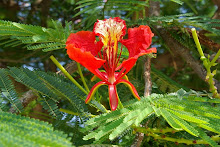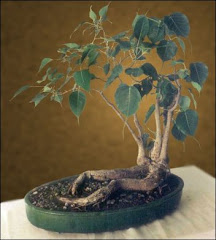
Well, this post makes it my 11th blog in a month. We are still on February 16th 2009, you see. And I will continue with poetry. My, My! I rhymed it.
Thats the way to go! A blog on poetry and no rhymes? Not done.
I am posting a few more of my favourite poems....actually half a dozen and three more. Guess it will take me several blogs to mention all my favourite poems....the list is quite long. Perhaps I will do it over several weeks, by and by.
These poems take us back to our childhood and help us relive our schooldays. It certainly did, for me.
I have listed down a dozen of my favourite poems in my previous blog (please visit: My favourite poems - one dozen of them! to read them) and therefore will start this list with poem number 13. No, I am not superstitious! I assure you.
Here too, I begin with a composition of the great American poet Robert Frost (March 26, 1874 – January 29, 1963).
13) 'Nothing Gold can Stay' by Robert Frost:
Nature's first green is gold,
Her hardest hue to hold.
Her early leaf's a flower;
But only so an hour.
Then leaf subsides to leaf.
So Eden sank to grief,
So dawn goes down to day.
Nothing gold can stay.
14) 'The Tiger' by William Blake:
Tiger! Tiger! burning bright
In the forests of the night
What immortal hand or eye
Could frame thy fearful symmetry?
In what distant deeps or skies
Burnt the fire of thine eyes?
On what wings dare he aspire?
What the hand dare seize the fire?
Burnt the fire of thine eyes?
On what wings dare he aspire?
What the hand dare seize the fire?
And What shoulder, and what art,
Could twist the sinews of thy heart?
And when thy heart began to beat,
What dread hand? and what dread feet?
Could twist the sinews of thy heart?
And when thy heart began to beat,
What dread hand? and what dread feet?
What the hammer? what the chain? I
n what furnace was thy brain?
What the anvil? what dread grasp
Dare its deadly terrors clasp?
n what furnace was thy brain?
What the anvil? what dread grasp
Dare its deadly terrors clasp?
When the stars threw down their spears,
And watered heaven with their tears,
Did he smile his work to see?
Did he who made the lamb make thee?
And watered heaven with their tears,
Did he smile his work to see?
Did he who made the lamb make thee?
Tiger! Tiger! burning bright
In the forests of the night,
What immortal hand or eye
Dare frame thy fearful symmetry?
In the forests of the night,
What immortal hand or eye
Dare frame thy fearful symmetry?
15) 'The Walrus and the Carpenter' by Lewis Carroll:
This interesting poem is extracted from 'Through the Looking Glass' by Lewis Carroll.
The sun was shining on the sea,
Shining with all his might:
He did his very best to make
The billows smooth and bright --
And this was odd, because it was
The middle of the night.
Shining with all his might:
He did his very best to make
The billows smooth and bright --
And this was odd, because it was
The middle of the night.
The moon was shining sulkily,
Because she thought the sun
Had got no business to be there
After the day was done --
'It's very rude of him.' she said,
'To come and spoil the fun!
Because she thought the sun
Had got no business to be there
After the day was done --
'It's very rude of him.' she said,
'To come and spoil the fun!
'The sea was wet as wet could be,
The sands were dry as dry.
You could not see a cloud, because
No cloud was in the sky:
No birds were flying overhead --
There were no birds to fly.
The sands were dry as dry.
You could not see a cloud, because
No cloud was in the sky:
No birds were flying overhead --
There were no birds to fly.
The Walrus and the Carpenter
Were walking close at hand:
They wept like anything to see
Such quantities of sand:
'If this were only cleared away,
'They said, 'it would be grand.
Were walking close at hand:
They wept like anything to see
Such quantities of sand:
'If this were only cleared away,
'They said, 'it would be grand.
''If seven maids with seven mops
Swept it for half a year,
Do you suppose,' the Walrus said,
'That they could get it clear?
''l doubt it,' said the Carpenter,
And shed a bitter tear.
Swept it for half a year,
Do you suppose,' the Walrus said,
'That they could get it clear?
''l doubt it,' said the Carpenter,
And shed a bitter tear.
'O Oysters, come and walk with us!
The Walrus did beseech.
'A pleasant walk, a pleasant talk,
Along the briny beach:
We cannot do with more than four,
To give a hand to each.
The Walrus did beseech.
'A pleasant walk, a pleasant talk,
Along the briny beach:
We cannot do with more than four,
To give a hand to each.
'The eldest Oyster looked at him,
But never a word he said:
The eldest Oyster winked his eye,
And shook his heavy head --
Meaning to say he did not choose
To leave the oyster-bed.
But never a word he said:
The eldest Oyster winked his eye,
And shook his heavy head --
Meaning to say he did not choose
To leave the oyster-bed.
Out four young Oysters hurried up.
All eager for the treat:
Their coats were brushed, their faces washed,
Their shoes were clean and neat --
And this was odd, because, you know,
They hadn't any feet.
All eager for the treat:
Their coats were brushed, their faces washed,
Their shoes were clean and neat --
And this was odd, because, you know,
They hadn't any feet.
Four other Oysters followed them,
And yet another four;
And thick and fast they came at last,
And more, and more, and more --
All hopping through the frothy waves,
And scrambling to the shore.
And yet another four;
And thick and fast they came at last,
And more, and more, and more --
All hopping through the frothy waves,
And scrambling to the shore.
The Walrus and the Carpenter
Walked on a mile or so,
And then they rested on a rock
Conveniently low:
And all the little Oysters stood
And waited in a row.
Walked on a mile or so,
And then they rested on a rock
Conveniently low:
And all the little Oysters stood
And waited in a row.
'The time has come,' the Walrus said,
'To talk of many things:
Of shoes -- and ships -- and sealing wax --
Of cabbages -- and kings --
And why the sea is boiling hot --
And whether pigs have wings.
'To talk of many things:
Of shoes -- and ships -- and sealing wax --
Of cabbages -- and kings --
And why the sea is boiling hot --
And whether pigs have wings.
''But wait a bit,' the Oysters cried,
'Before we have our chat;
For some of us are out of breath,
And all of us are fat!
''No hurry!' said the Carpenter.
They thanked him much for that.
'Before we have our chat;
For some of us are out of breath,
And all of us are fat!
''No hurry!' said the Carpenter.
They thanked him much for that.
'A loaf of bread,' the Walrus said,
'Is what we chiefly need:
Pepper and vinegar besides
Are very good indeed --
Now, if you're ready,
Oysters dear,We can begin to feed.
'Is what we chiefly need:
Pepper and vinegar besides
Are very good indeed --
Now, if you're ready,
Oysters dear,We can begin to feed.
''But not on us!' the Oysters cried,
Turning a little blue.
'After such kindness, that would be
A dismal thing to do!
''The night is fine,' the Walrus said,
'Do you admire the view?
Turning a little blue.
'After such kindness, that would be
A dismal thing to do!
''The night is fine,' the Walrus said,
'Do you admire the view?
''It was so kind of you to come!
And you are very nice!
'The Carpenter said nothing but
'Cut us another slice-
I wish you were not quite so deaf-
I've had to ask you twice!
And you are very nice!
'The Carpenter said nothing but
'Cut us another slice-
I wish you were not quite so deaf-
I've had to ask you twice!
''It seems a shame,' the Walrus said,
'To play them such a trick.
After we've brought them out so far,
And made them trot so quick!
'The Carpenter said nothing but
'The butter's spread too thick!
'To play them such a trick.
After we've brought them out so far,
And made them trot so quick!
'The Carpenter said nothing but
'The butter's spread too thick!
''I weep for you,'the Walrus said:
'I deeply sympathize.
'With sobs and tears he sorted out
Those of the largest size,
Holding his pocket-handkerchief
Before his streaming eyes.
'I deeply sympathize.
'With sobs and tears he sorted out
Those of the largest size,
Holding his pocket-handkerchief
Before his streaming eyes.
'O Oysters,' said the Carpenter,
'You've had a pleasant run!
Shall we be trotting home again?
'But answer came there none --
And this was scarcely odd, because
They'd eaten every one.
'You've had a pleasant run!
Shall we be trotting home again?
'But answer came there none --
And this was scarcely odd, because
They'd eaten every one.
16) 'The Sound of the Trees' by Robert Frost:
I wonder about the trees.
Why do we wish to bear
Forever the noise of these
More than another noise
So close to our dwelling place?
We suffer them by the day
Till we lose all measure of pace,
And fixity in our joys,
And acquire a listening air.
They are that that talks of going
But never gets away;
And that talks no less for knowing,
As it grows wiser and older,
That now it means to stay.
My feet tug at the floor
And my head sways to my shoulder
Sometimes when I watch trees sway,
From the window or the door.
I shall set forth for somewhere,
I shall make the reckless choice
Some day when they are in voice
And tossing so as to scare
The white clouds over them on.
I shall have less to say, But I shall be gone.
17) 'On the Grasshopper and Cricket' by John Keats:
The poetry of earth is never dead:
When all the birds are faint with the hot sun,
And hide in cooling trees, a voice will run
From hedge to hedge about the new-mown mead;
That is the Grasshopper's--he takes the lead
In summer luxury,--he has never done
With his delights; for when tired out with fun
He rests at ease beneath some pleasant weed.
The poetry of earth is ceasing never:
On a lone winter evening, when the frost
Has wrought a silence, from the stove there shrills
The Cricket's song, in warmth increasing ever,
And seems to one in drowsiness half lost,
The Grasshopper's among some grassy hills.
When all the birds are faint with the hot sun,
And hide in cooling trees, a voice will run
From hedge to hedge about the new-mown mead;
That is the Grasshopper's--he takes the lead
In summer luxury,--he has never done
With his delights; for when tired out with fun
He rests at ease beneath some pleasant weed.
The poetry of earth is ceasing never:
On a lone winter evening, when the frost
Has wrought a silence, from the stove there shrills
The Cricket's song, in warmth increasing ever,
And seems to one in drowsiness half lost,
The Grasshopper's among some grassy hills.
18) 'My Shadow' by Robert Louis Stevenson: From Child's Garden of Verses -
I have a little shadow that goes in and out with me,
And what can be the use of him is more than I can see.
He is very, very like me from the heels up to the head;
And I see him jump before me, when I jump into my bed.
And what can be the use of him is more than I can see.
He is very, very like me from the heels up to the head;
And I see him jump before me, when I jump into my bed.
The funniest thing about him is the way he likes to grow--
Not at all like proper children, which is always very slow;
For he sometimes shoots up taller like an india-rubber ball,
And he sometimes goes so little that there's none of him at all.
Not at all like proper children, which is always very slow;
For he sometimes shoots up taller like an india-rubber ball,
And he sometimes goes so little that there's none of him at all.
He hasn't got a notion of how children ought to play,
And can only make a fool of me in every sort of way.
He stays so close behind me, he's a coward you can see;
I'd think shame to stick to nursie as that shadow sticks to me!
And can only make a fool of me in every sort of way.
He stays so close behind me, he's a coward you can see;
I'd think shame to stick to nursie as that shadow sticks to me!
One morning, very early, before the sun was up,
I rose and found the shining dew on every buttercup;
But my lazy little shadow, like an arrant sleepy-head,
Had stayed at home behind me and was fast asleep in bed.
I rose and found the shining dew on every buttercup;
But my lazy little shadow, like an arrant sleepy-head,
Had stayed at home behind me and was fast asleep in bed.
19) 'If' by Rudyard Kipling:
If you can keep your head when all about you
Are losing theirs and blaming it on you;
If you can trust yourself when all men doubt you,
But make allowance for their doubting too:
If you can wait and not be tired by waiting,
Or, being lied about, don't deal in lies,
Or being hated don't give way to hating,
And yet don't look too good, nor talk too wise;
If you can dream - and not make dreams your master;
If you can think - and not make thoughts your aim,
If you can meet with Triumph and Disaster
And treat those two impostors just the same:
If you can bear to hear the truth you've spoken
Twisted by knaves to make a trap for fools,
Or watch the things you gave your life to, broken,
And stoop and build'em up with worn-out tools;
If you can make one heap of all your winnings
And risk it on one turn of pitch-and-toss,
And lose, and start again at your beginnings,
And never breathe a word about your loss:
If you can force your heart and nerve and sinew
To serve your turn long after they are gone,
And so hold on when there is nothing in you
Except the Will which says to them: "Hold on!"
If you can talk with crowds and keep your virtue,
Or walk with Kings - nor lose the common touch,
If neither foes nor loving friends can hurt you,
If all men count with you, but none too much:
If you can fill the unforgiving minute
With sixty seconds' worth of distance run,
Yours is the Earth and everything that's in it,
And - which is more - you'll be a Man, my son!
20) 'Adieu, Adieu! My Native Land' by Lord Byron:
George Gordon Byron, later Noel, the 6th Baron Byron FRS (22 January 1788 – 19 April 1824) was a British poet and a leading figure in Romanticism. He was one of the most prolific and controversial of the great English Romantic poets.
Adieu, adieu! my native shore
Fades o'ver the waters blue;
The night-winds sigh, the breakers roar,
And shrieks the wild sea-mew.
Yon sun that sets upon the sea
We follow in his flight;
Farewell awhile to him and thee,
My native Land-Good Night!
A few short hours, and he will rise
To give the morrow birth;
And I shall hail the main and skies,
But not my mother earth.
Deserted is my own good hall,
Its hearth is desolate;
Wild weeds are gathering on the wall;
My dog howls at the gate.
21) 'La Belle Dame Sans Merci' by John Keats:
Ah, what can ail thee, wretched wight,
Alone and palely loitering?
The sedge is withered from the lake,
And no birds sing.
Ah, what can ail thee, wretched wight,
So haggard and so woe-begone
The squirrel's granary is full,
And the harvest's done.
I see a lily on thy brow
With anguish moist and fever dew,
And on thy cheek a fading rose
Fast withereth too.
I met a lady in the meads,
Full beautiful, a faery's child:
Her hair was long, her foot was light,
And her eyes were wild.
I set her on my pacing steed,
And nothing else saw all day long;
For sideways would she lean,
and singA faery's song.
I made a garland for her head,
And bracelets too, and fragrant zone;
She looked at me as she did love,
And made sweet moan.
She found me roots of relish sweet,
And honey wild, and manna dew,
And sure in language strange she said,
"I love thee true!"
She took me to her elfin grot,
And there she gazed and sighed deep,
And there I shut her wild, sad eyes--
So kissed to sleep.
And there we slumbered on the moss,
And there I dreamed, ah! woe betide,
The latest dream I ever dreamed
On the cold hill side.
I saw pale kings, and princes too,
Pale warriors, death-pale were they all;
Who cried--"La belle Dame sans merci
Hath thee in thrall!"
I saw their starved lips in the gloam,
With horrid warning gaped wide,
And I awoke and found me here,
On the cold hill side.
And that is why I sojourn here,
Alone and palely loitering,
Though the sedge is withered from the lake,
And no birds sing.
(More later)
Photograph: Looking through a Kaleidoscope.














I read the new poems you posted. Thanks! They are really nice.
ReplyDeleteWe have similar tastes. I would include 'Colours' by Ashok Mahajan, Intrepid ny WA Henley and Nightingales by Robert Bridges. Of course John Masefield's 'Cargos' and Robert Browning's Pied Piper of Hamelin.
ReplyDeleteYou can enjoy my three favourite nature poems on my blog -
thebutterflydiaries.wordpress.com
@ Rajdeep: Glad you liked them.
ReplyDelete@ thebutterflydiaries: Yes, they are all lovely poems, indeed!
ReplyDeleteP.S. Thanks for stopping by my blog, though. Do stay tuned.